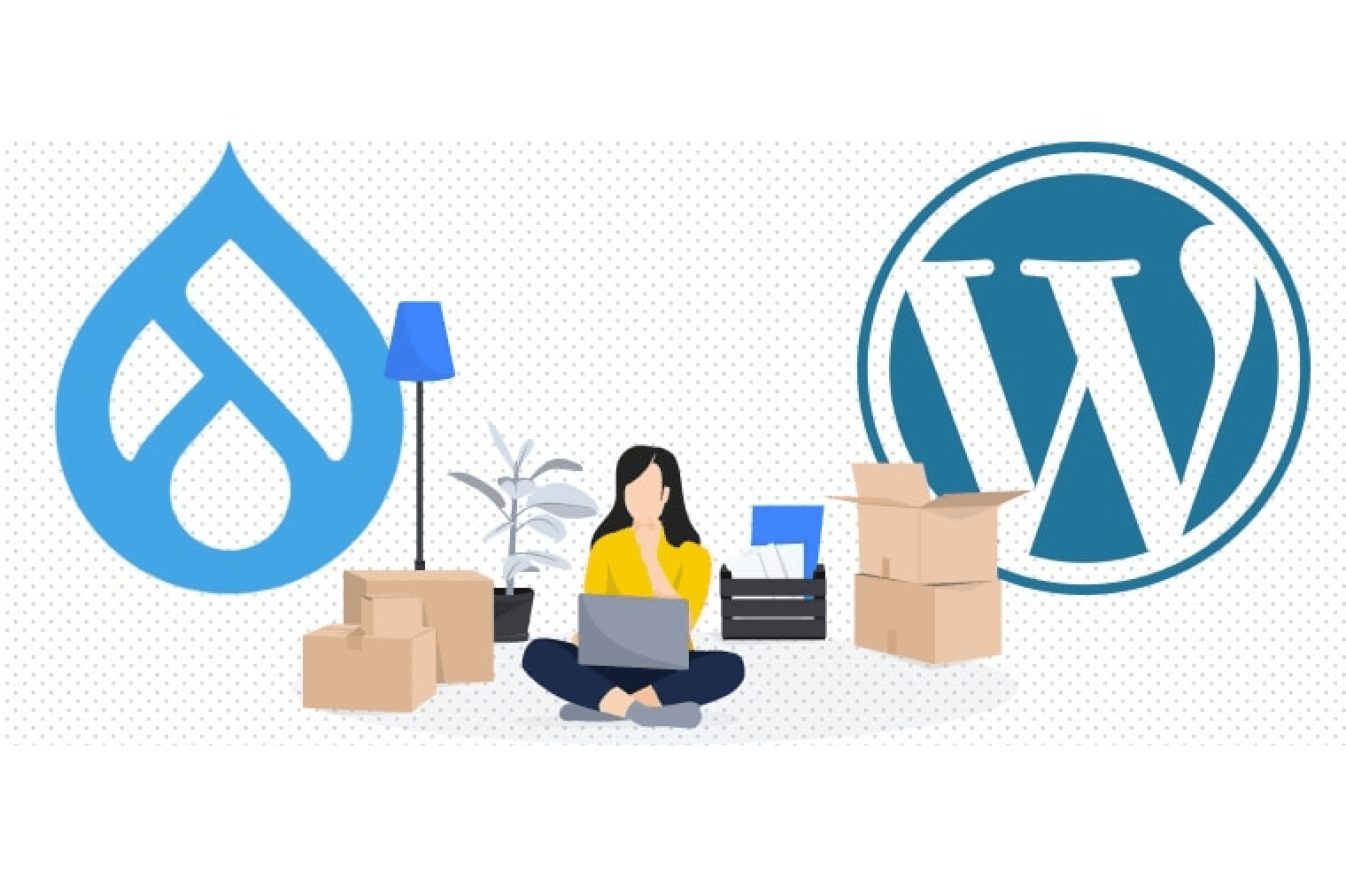The Benefits Of Moving From Drupal To WordPress
In the battle of the CMS’s, a frequent pairing is WordPress vs Drupal. Both are free, open source, and have been around for quite some time.

Oops! We could not locate your form.
In the battle of the CMS’s, a frequent pairing is WordPress vs Drupal. Both are free, open source, and have been around for quite some time.

But whilst WordPress continues to grow its market share, Drupal has experienced a slow downward trend.
At one point Drupal seemed to be the darling of many government and local government websites, but we’re now seeing many switch over to WordPress.
Most notably in 2018, the US White House website moved from Drupal to WordPress, with the Biden administration then choosing to stay with WordPress for the latest version of the site.
So why are so many making the move from Drupal to WordPress?
I’m going to take a look at some key areas that provide us with some answers, and may help you with your decision.
A key decider on the platforms that businesses embrace is ease of use. People no longer want to have to pay someone else to make simple changes or additions to their website.
Businesses need to be reactive, and be able make changes quickly, to keep up with the competition.
Whilst Drupal is a powerful platform with a lot of flexibility for development, for the everyday user without coding knowledge, it can be difficult to manage and navigate. It’s infrastructure and interface are complex.
For a business with its own dedicated, in-house Drupal development team, it’s a fantastic option. But for those businesses that rely on outside agencies to develop their website, Drupal can become a blocker to progress and change.
WordPress on the other balances power with usability. A business website created by a good developer is a gift to marketing teams. Without additional development, they can create new pages, add new products, services or case studies, and easily update their blog.
Whilst Drupal offers modules, its third-party ad-ons, WordPress’s plug-ins are far more numerous in selection and scope.
Added to this, WordPress has a huge international development and support community who are very active, whereas Drupal’s is considerably smaller.
SEO is a key concern for most businesses. Both Drupal and WordPress are solid platforms for search performance, but WordPress gives you access to Yoast and other powerful plugins and tools.
For a long time WordPress suffered from an image problem, due to its early life as a blog platform. As it evolved and grew into a powerful CMS solution, it struggled to shrug off its early image. As such it was often overlooked by many businesses looking for a CMS.
Drupal didn’t have this issue, so for those looking to move from expensive, licenced enterprise platforms, to something open source, it seemed the best option.
Another image problem faced by WordPress is that people think that it isn’t as secure as Drupal. But here it is a victim of its own popularity. It is cited as the most hacked CMS, but this is slightly misleading due to its market share.
There are far more WordPress websites out there than any on any other platform. So of course there are more WordPress hacks. They have a 65% share of the CMS market and WordPress powers 40% of all websites on the internet. So this creates a heavy skew as it is.
Then consider that millions of those WordPress sites will be old blogs or affiliate sites, that people have abandoned or failed to update plugins on. Instantly you can see why they’d be vulnerable to attacks, and why the numbers are what they are.
The fact that WordPress is so accessible and used for a broad spectrum of website types, from huge international businesses, down to individuals with casual hobby blogs, means that people are given a false impression of it’s security.
A well-built WordPress website, that is maintained, updated and uses trusted and supported plugins, is as secure as any other.
As this becomes more widely acknowledged and fears are assuaged, we’re seeing more large businesses move from Drupal to WordPress.
Both Drupal and WordPress receive updates and new versions. However, where updating to a new WordPress version is pretty straightforward, Drupal is another matter.
Drupal’s versions are not forward-compatible. If you have a website built on Drupal 7 or 8 and wish to move to Drupal 9, you will often require a considerable amount of development work, with the cost that it entails.
For WordPress, rolling forward to a new version shouldn’t cause much of an issue, other than the potential of a few plugins needing to update their compatibility.
If you keep your site up-to-date in terms of updates and plugins, your WordPress site gives you longevity.
What’s more, with a market share as large, and a huge community, WordPress is unlikely to go anywhere anytime soon.
This is by no means an exhaustive look at either platform, and we encourage you to explore which one will suit your business’s needs best.
But in the majority of cases, we find WordPress to be the more suitable of the two for most use cases, due to the reasons above among many others.
It’s why we choose to specialise in designing and developing for WordPress (which you can read more about here).
If you have any questions, or custom functionality you require from your website and you’re not sure if it can be delivered with WordPress, drop us a message or a call. Our team excels at creating custom integrations and functionality.


WordPress Core version 6.5 was released on April 2nd. So let's take a quick look at some of the main changes it brings with it.
 Richard Ramirez
Richard Ramirez

WordPress Core version 6.4 is released today. So let's take a quick look at some of the main changes it brings with it.
 Richard Ramirez
Richard Ramirez

If you're looking for the right contact form solution for your WordPress or WooCommerce website, there are certainly no shortage of options on the market.
 Richard Ramirez
Richard Ramirez